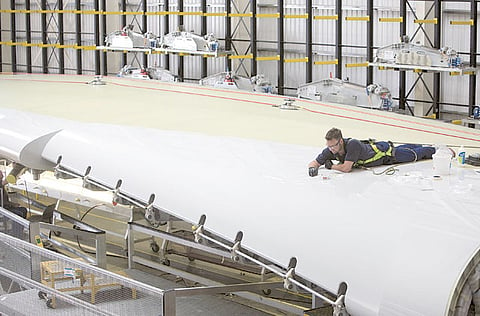A380 operators to ground fleet for 8 weeks
Wing-crack debacle has cost Airbus millions of dirhams in repair and service costs

Beijing: Airbus SAS said airlines flying the A380 double-decker will need to ground their aircraft for as long as eight weeks when the wings undergo permanent repair work that is more complex than a short-term fix being done now.
Airbus Chief Operating Officer John Leahy confirmed the time frame, after Emirates President Tim Clark said the final fix can take eight weeks.
“Of course we are not happy, but we have to live with it,” Clark said in the interview on Monday in Beijing. “There was an error in design and specification of metals and plastic composite to the aircraft. They are making detailed studies of what happened and what they have to do.”
The wing-crack debacle has cost Airbus more than €250 million (Dh1,154 million) in repair and service costs, and the manufacturer has said the issue will occupy the company for years. Emirates is the biggest A380 customer, with 90 aircraft on order in total, and the company has already taken delivery of 35 of the double-decker aircraft. It has 14 more scheduled for delivery that will require the eight-week removal from service.
The cracks are the result of new technologies mixed with insufficient design controls. Airbus engineers have determined an altered design for the wing that would use different materials. Once safety authorities have approved the change, Airbus can alter manufacturing of the wings in Broughton, Wales, allowing aircraft coming off the production line by January 2014 to be free of the defect.
Safe to fly
Planes delivered from now until the beginning of 2014 still contain the defect, and require both short-term fixes if cracks develop, as well as the repair that can take eight weeks per aircraft. Airlines taking delivery before 2014 will have the choice between an immediate fix once the aircraft come off production lines, or repairs in stages during required maintenance checks after two and four years, Leahy said.
The shorter repairs that come first are supposed to take about six days, according to Airbus. Clark said some of his planes were out of service for 42 days to get the fix.
“It’s taking quite a long time because we have the largest fleet,” Clark said. “Will it get done? Of course it will get done. Is the aircraft safe to fly? Of course it’s safe. It’s just a burden for us.”
Emirates isn’t seeking compensation and merely wants the job done, which is “hugely expensive” for Airbus, Clark said. He said Emirates has proposed that Airbus stop producing A380s and sort out the issue first, though Airbus rejected the idea. A report in La Depeche saying the grounding may take as long as three months is wrong, an Airbus spokesman said.
Airbus has traced the cause of the cracks to the choice of a less flexible aluminium alloy used to make the wing brackets, as well as the way in which fasteners are put through holes, and the stresses involved in fitting portions of the wing together.
The short-term fix has been applied to more than a third of the about 75 A380s in service. That solution will be applied to other operating A380s as the number of landings and take-offs reaches a threshold mandated by regulators that requires the fix.
Sign up for the Daily Briefing
Get the latest news and updates straight to your inbox


